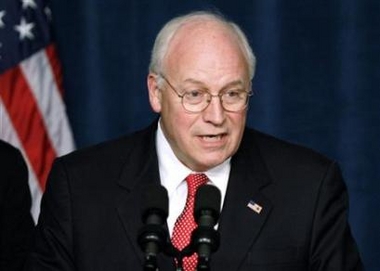|
Cheney pushes Senate for CIA exemption
(AP)
Updated: 2005-11-05 13:54
Vice President Dick Cheney made an unusual personal
appeal to Republican senators this week to allow CIA exemptions to a proposed
ban on the torture of terror suspects in U.S. custody, according to participants
in a closed-door session.

U.S. Vice President Dick Cheney is shown in
Perry, Georgia in this October 28, 2005 file photo. The indictment of
former top White House aide Lewis Libby in the CIA leak investigation will
put Cheney's office at the center of court proceedings, raising the
specter of a politically damaging trial for the beleaguered Bush
administration. [Reuters] |
Cheney told his audience the United States doesn't engage in torture, these
participants added, even though he said the administration needed an exemption
from any legislation banning "cruel, inhuman or degrading" treatment in case the
president decided one was necessary to prevent a terrorist attack.
The vice president made his comments at a regular weekly private meeting of
Senate Republican senators, according to several lawmakers who attended. Cheney
often attends the meetings, a chance for the rank-and-file to discuss
legislative strategy, but he rarely speaks.
In this case, the room was cleared of aides before the vice president began
his remarks, said by one senator to include a reference to classified material.
The officials who disclosed the events spoke on condition of anonymity, citing
the confidential nature of the discussion.
"The vice president's office doesn't have any comment on a private meeting
with members of the Senate," Steve Schmidt, a spokesman for Cheney, said on
Friday.
The vice president drew support from at least one lawmaker, Sen. Jeff
Sessions of Alabama, while Arizona Sen. John McCain dissented, officials said.
McCain, who was tortured while held as a prisoner during the Vietnam War, is
the chief Senate sponsor of an anti-torture provision that has twice cleared the
Senate and triggered veto threats from the White House.
Cheney's decision to speak at the meeting underscored both his role as White
House point man on the contentious issue and the importance the administration
attaches to it.
|